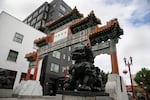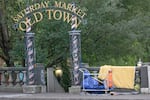Last fall, Kat Mahoney took a walk around Portland’s Old Town neighborhood.
Mahoney is the executive director of the homeless advocacy nonprofit Sisters of the Road, and on her mind was where a new potential home for the organization’s café could go. What Mahoney knew for sure was that Sisters of the Road, which had been a staple in the area for nearly 40 years, needed to stay in Old Town.
“I was walking around and I said, ‘I want the House of Louie’,” Mahoney said. “I didn’t know it was for sale, and then we looked, and it was like, ‘Oh my God, it’s for sale.’”
The House of Louie, a Chinese restaurant that served dim sum for 30 years, closed in 2018. It’s a vestige of Old Town’s once-vibrant Chinatown. But with its boarded-up doors, faded decorative dragons and graffitied exterior, the restaurant is just a shadow of itself now.
Still, Mahoney saw an opportunity. Sisters of the Road, widely known for offering meals to people at low cost or through its bartering system, had shut down its food operations amid the beginning of the pandemic in 2020. Deteriorating conditions in its existing location prompted the group’s board to start looking for a new building in 2022.

The Chinatown Gateway into Old Town Portland seen from Couch Street on Aug. 9, 2023. The distinctive red gate separates Old Town and Chinatown from the rest of downtown Portland.
Caden Perry / OPB
House of Louie’s name recognition, bigger space and central, corner location on Northwest Davis Street and Northwest Fourth Avenue fit the bill, Mahoney said. And it didn’t hurt that the building was just two blocks away from the original Sisters of the Road café.
“This is where we started,” Mahoney said. “Everyone who has ever come to the café or recognizes us knows that we’re in Chinatown.”
The nonprofit closed on a $1.9 million sale of the building earlier this year. And over the next two years, Sisters of the Road plans to invest another $3 million in renovations.
“I think when folks reinvest in their community or initially invest in their community, they’re saying they care about this place,” Mahoney said.
Old Town has become a microcosm of the many challenges Portland is facing now: increasing homelessness, the opioid crisis and public safety are just a few of the issues. Despite this, social services and entrepreneurs are continuing to bet on the neighborhood. It’s home to a community of people who are fiercely committed to uplifting and revitalizing the district. But they don’t always see eye to eye on ways to reach that goal.
Sisters of the Road’s move follows the footsteps of Street Roots. The nonprofit, which publishes a newspaper covering issues on homelessness, is renovating a building at Burnside Street and Northwest Third Avenue.
“This whole building we designed as Maslow’s hierarchy of needs,” Street Roots executive director Kaia Sand said. “It goes from one’s most basic needs to the higher needs. Our basement is foundational; so we’re going to have showers and laundry [there].”
Sand said she’d like to see the paper’s new headquarters become a space that uplifts everyone in the community.
Down but not out
Old Town is Portland’s oldest neighborhood. And the waterfront district has a rich history. Since the 19th century, it’s been a place where Chinese, Japanese and other immigrants rebuilt their lives and found community. The neighborhood has also been home to a number of LGBTQ-friendly bars and clubs.
More recently, Old Town has become known for another marginalized community: people suffering from poverty, homelessness, behavioral health issues or drug addiction.
Still, a lot of people are betting on Old Town. Several new businesses, like Goodies Snack Shop, arrived in the past year. The corner store on Northwest Second Avenue and Northwest Davis Street is co-owned by Terence Brasch and Joyce Chung. The chic shop started selling grab-and-go snacks like chips, rice crackers and noodles in September 2022.
“Terence and I opened up this shop with the hopes of just bringing some bright, cheerful life into a beautiful neighborhood,” said Chung, who enjoys taking breaks on Old Town’s waterfront.
Chung and Brasch acknowledge that operating a new business in a neighborhood that’s in recovery has its challenges. But they say the support they’ve gotten from the community — from the tea shop next door to Street Roots across the street and Lan Su Chinese Garden a few blocks away — is one reason they want to stay.
“We actually know all of our neighbors,” Chung said. “It’s the neighborhood experience that I never really had before but also one that people wouldn’t expect from the outside looking in.”

A man lies on the sidewalk of Flanders Street and Pacific Highway 99 in Portland on Aug. 9, 2023. The Chinatown section of Old Town Portland has been undergoing several revitalization projects, including facelifts for empty windows and building walls.
Caden Perry / OPB
The public perception of Old Town, especially as seen in recent national media accounts, paints a more desperate picture that includes discarded needles, human feces on sidewalks and people overdosing in public. This alternate view is damaging to the community, especially to people experiencing drug addiction and street sweeps, said Street Roots’ Sand.
“With a neighborhood where people are living their lives in public so much, you just come to know each other a little bit better,” said Sand, who describes Old Town as a warm neighborhood. “That’s not at all to gloss over the fact that this is a neighborhood so hard hit by fentanyl.”
Old Town has been reeling after a series of homicides and drug crimes. The area was hit particularly hard from mid-2021 through 2022 with an increase in violent crimes and drug offenses, according to Portland Police Bureau data.
Assault crimes remain at a near-constant level. Jessie Burke, owner of The Society Hotel and president of the Old Town Community Association, would like to see much less of that.
“But I do think in times of crisis, there are also times of renaissance,” Burke said. “And I think small businesses tend to blossom during that time.”
The neighborhood association Burke leads includes business owners, residents and nonprofits. It’s helped bring in and support businesses, like Goodies Snack Shop.
Burke said it’s exciting when new retail and quick-service food shops move into the community because these types of businesses help generate daytime interest and foot traffic, something Old Town sorely needs.
An Old Town business stimulus strategy, released by ECONorthwest in 2021, identified that the district needs more retail stores like nurseries, home goods shops and small grocery stores.
What it does not need, according to Burke, is more social service organizations — like Sisters of the Road and Street Roots — doubling down in the neighborhood.
“It’s not adding to the mix that is going to actually create some dynamic change,” Burke said.
To help spur change in the neighborhood, the Old Town Community Association spearheaded a so-called 90-day reset with the city of Portland in March 2022. It was a short-spurt effort meant to clean up the neighborhood, reduce crime and give the area an overall facelift. City officials reported the removal of nearly 350 tent encampments and a 51% decrease in reported drug offenses after the 90 days were over.
To some, the plan was seen as a success. Others saw it as a tool that fractured the community. The strategy has been copied in the city’s Central Eastside.

The Chinatown Gateway on Burnside and 4th Street that creates part of the southern border to the Old Town district of Portland on Aug. 9, 2023. Chinatown is recognized as a part of the Old Town district and is home to many Chinese and Japanese cultural centers.
Caden Perry / OPB
Can social service organizations and businesses get along?
With its central location and easy access to public transportation, Old Town has a high concentration of social services organizations. Central City Concern, Union Gospel Mission and Blanchet House are just a handful of the many nonprofits that serve people experiencing homelessness in the neighborhood.
While nonprofits consider the benefits of being close together, some business owners don’t want more service organizations in the neighborhood or expansion by groups already based here. In a written statement to OPB, Portland Commissioner Carmen Rubio, who oversees the city’s Bureau of Planning and Sustainability, said that where social service agencies should be in Portland depends on several factors.
“Community and social service organizations sometimes benefit from being near one another, as do the people they serve,” Rubio said. “But there are people in need of support all across Portland, so dispersing services throughout the city should always be the goal.”
Burke said she believes social services, residents and small businesses can all coexist in one neighborhood. But she said it will take open communication based on mutual respect between everyone.
“If social service agencies want the community to be bought into their cause, we need them to also be bought into our cause,” Burke said.

A metal sign introducing people to the Old Town district of Portland on Burnside Bridge on Aug. 9, 2023. Old Town is Portland's oldest neighborhood and started as a community for immigrants, creating the distinctive Chinatown style of the district.
Caden Perry / OPB
Ian Williams, owner of Deadstock Coffee in Old Town, shared a similar sentiment.
“There’s still so much potential in this neighborhood,” said Williams, who opened up his coffee shop in 2016.
Williams thinks the greatest potential is between private businesses and social services organizations: “How come we don’t work together?”
Staff at Sisters of the Road are keenly aware that not everyone in Old Town is excited about their new building. Gus Kroll, the president of the nonprofit’s board, said he’s willing to partner with businesses and that a strong neighborhood is built on shared values.
“It’s like we both want a cleaner street,” Kroll said. “So maybe we both have a vested interest — even if we’re coming from very different positions — to advocate for public restrooms.”
Pledges to work together and build community are easy to say but with differing views on exactly how to revitalize Old Town, it’s a lot harder to put into practice.
One thing that is clear: Old Town has a lot of people rooting for it.
“People should believe in Old Town because Old Town is fire,” Williams said. “That’s it.”
